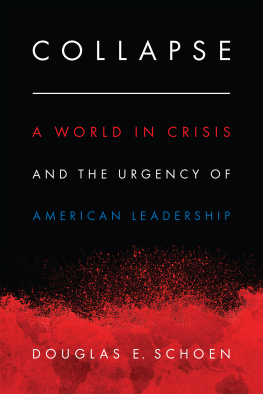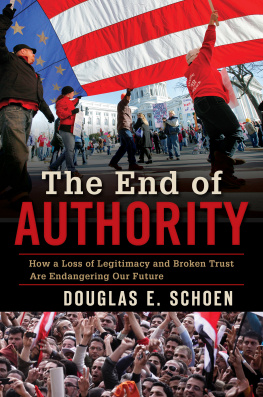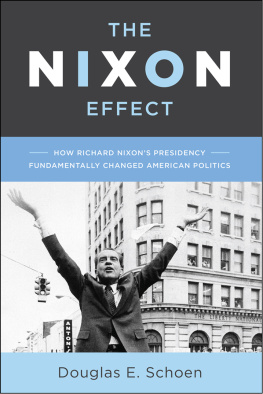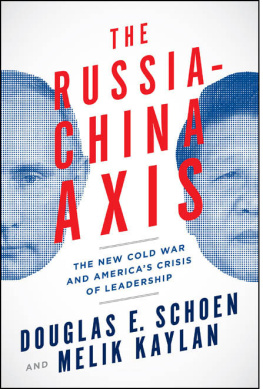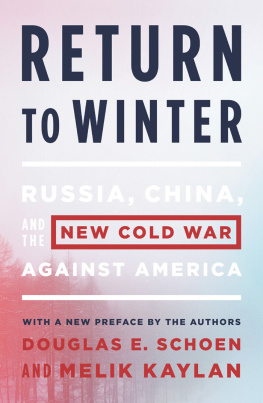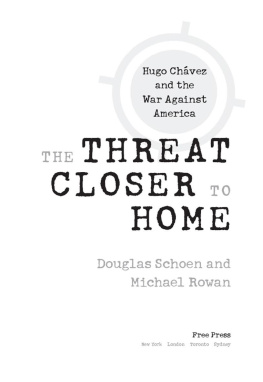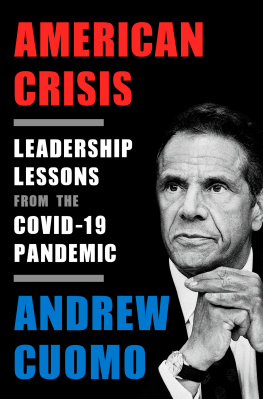2019 by Douglas E. Schoen
All rights reserved. No part of this publication may be reproduced, stored in a retrieval system, or transmitted, in any form or by any means, electronic, mechanical, photocopying, recording, or otherwise, without the prior written permission of Encounter Books, 900 Broadway, Suite 601, New York, New York, 10003.
First American edition published in 2019 by Encounter Books, an activity of Encounter for Culture and Education, Inc., a nonprofit, tax exempt corporation.
Encounter Books website address: www.encounterbooks.com
Manufactured in the United States and printed on acid-free paper. The paper used in this publication meets the minimum requirements of ANSI/NISO Z39.481992 (R 1997) (Permanence of Paper).
FIRST AMERICAN EDITION
LIBRARY OF CONGRESS CATALOGING-IN-PUBLICATION DATA
Names: Schoen, Douglas E., 1953 author.
Title: Collapse : a world in crisis and the urgency of American leadership / by Douglas E. Schoen.
Description: New York : Encounter Books, 2019. | Includes bibliographical references and index.
Identifiers: LCCN 2018043851 (print) | LCCN 2018047231 (ebook) | ISBN 9781641770354 (ebook) | ISBN 9781641770347 (hardcover : alk. paper)
Subjects: LCSH: World politics21st century. | United StatesForeign relations21st century.
Classification: LCC D863 (ebook) | LCC D863 .S384 2019 (print) | DDC 909.83/12dc23
LC record available at https://lccn.loc.gov/2018043851
Interior page design and composition: BooksByBruce.com
INTRODUCTION
WHEN THE WORLD KNEW
The larger point is that this is something we are seeing all over, the top detaching itself from the bottom. Something big is happening here with this division between the leaders and the led. It is very much a feature of our age.
PEGGY NOONAN
I t was Pennsylvania that put him over the top, and it was past two in the morning on the East Coast on November 9, 2016, when Donald Trump won the presidency, much to the shockand dismayof the media, the political class, millions of Americans, and countless millions around the world.
This was a primal scream on the part of a lot of voters who are disenchanted with the status quo, David Axelrod, Barack Obamas former top adviser, told CNN.
However one viewed it, Trumps win represented the crescendo of half a decade or more of anti-establishment politics around the world, a raucous era of audacious terror attacks, global financial panics and economic recessions, technological disruptions, and political and institutional upheavals that have made the early twenty-first century as unpredictable and unstable as any recent era in at least a century. For years before 2016, electorates in other countries had been flirting with, or choosing, anti-establishment parties and leadersbut no one truly believed that someone quite as disruptive as Donald Trump could really become president of the worlds superpower and de facto leader of the free world.
Were still getting used to it. But the problems and trends that led to Trumps shock emergence have been festering for years, in the United States and around the world.
In 2013, in my book The End of Authority, I warned that the loss of legitimacy and broken trust in institutionsfrom the United States to Europe, from the Far East to Africa and Latin Americaposed grave threats to the future of free societies, the stability of the international system, and global security. The most significant global crisis since the 1930s, I wrote, could lead in any number of damaging directions if governments dont work to regain the trust of their citizens.
Back then, I was writing in the wake of an international financial crisis that was testing governments around the world fiscally, economically, and politically; eroding confidence and trust in institutions, in the United States and internationally; and leading to the rise of anti-systemic parties and politicians worldwide. But I was writing before the outbreak of the Syrian civil war and refugee crisis, the emergence and eventual decline (at least militarily) of ISIS, the Brexit vote, and other forces of division impacting European unityand, needless to say, before voters in the United States sent the most anti-systemic candidate in American history to the White House.
The global situation is far darker nowand so unstable and volatile that a war breaking out at almost any time cannot be ruled out. Rather than a decline of authority and an erosion of trust, we risk full-scale collapse of both, especially as reflected in popular contempt for established institutional authority.
In short, it is clear to me that we are now well beyond the crisis point that inspired The End of Authority, when I warned that nothing less than global stability and a functioning international order are at stake. Indeed, global instability has become the norm rather than the exception. In recent years, we have seen a mounting barrage of terror attacks, failed states and governments, anti-systemic political candidates, rising tides of nationalism and nativism, and economic sclerosis.
We didnt reach this point of global populism, populist political movements, and accelerating institutional illegitimacy through any one path. Rather, a series of interlocking developments brought us to where we are:
Failed leadership, especially in the West, has delegitimized political and social institutions, alienated millions from the political process, and fostered impassioned, broadly supported populist movements, which range in orientation from hard left to hard right, anti-systemic to neo-Nazi.
The failures of democratic governance have emboldened authoritarian leaders worldwide, especially Russias Vladimir Putin but also Chinas Xi Jinpingand, worse, as democracy loses its luster, even among some in the West, the allure of authoritarianism grows as an alternative political model and a foundation of order and security in a world seemingly spinning out of control.
Cybersecurity and the threat of hackersas reflected in Russian hacking of the Democratic National Committee (DNC) emails and other efforts to undermine the 2016 election in the United Statespose threats that, by every indication, Western governments are not prepared to meet; cyber warfare is another component of the authoritarian challenge.
Security challenges from rogue states, like Iran and North Korea, continue to mount, especially as they enjoy critical backing from antidemocratic powers like Russia and China.
Terrorism and radical Islam remain a fundamental challenge to the security of Western societies, as well as a scourge of millions of peace-loving Muslims around the world, whether in the Middle East, Africa, or elsewhere; ISISs reign of terror, even if now essentially defeated, reminded complacent Western observers of the appeal of millenarian Islam to millions of disaffected Muslim young men, and of its deadly consequences.
Beyond Islamist terror, the rise and proliferation of narco-fueled terror among international criminal gangs in the developing world, especially in Latin America, adds a new dimension of disruption, violence, and anti-Western sentiment.


